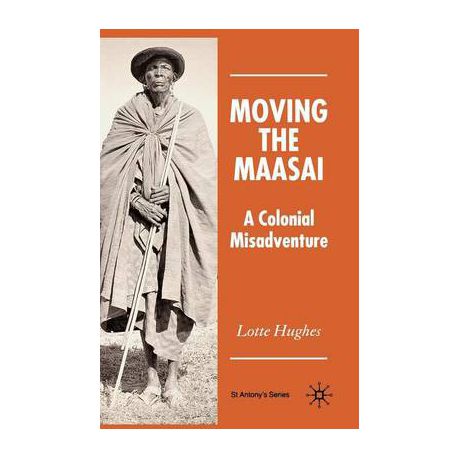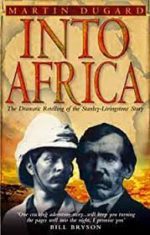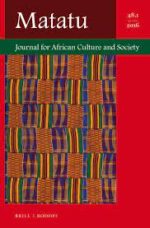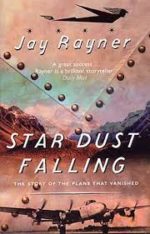This is the scandalous story of how the Maasai people of Kenya lost the best part of their land to the British in the 1900s. Drawing upon unique oral testimony and extensive archival research, Hughes describes the intrigues surrounding two enforced moves and the 1913 lawsuit, while explaining why recent events have brought the story full circle.
Moving the Maasai: A Colonial Misadventure (St Antony’s Series) 1st ed. 2006 Edition
KShs 15,260.00
1 in stock
| SKU: | 9781349545483 |
|---|---|
| Categories: | African Interest, History books |
| Author | L. Hughes |
|---|
Related products
-
Into Africa: The Epic Adventures Of Stanley And Livingstone by MARTIN DUGARD
KShs 2,000.00A gripping retelling of the legendary story of Livingstone and Stanley.
In 1866 Britain’s foremost explorer, Dr David Livingstone, went in search of the answer to an age- old geographical riddle- where was the source of the Nile? Livingstone set out with a large expedition, on a course that would lead through nearly impenetrable, unmapped terrain, and into areas populated by fearsome man- eating tribes. Within weeks his intended journey began to fall apart- his entourage deserted him and Livingstone vanished without trace into the African interior. He would not be heard from again for two years.While debate raged in England over whether Livingstone could be found in the unmapped wilderness of Africa, James Gordon Bennet, a brash young American newspaper tycoon, hatched a plan to capitalise on the world’s fascination with the missing legend. He commissioned his star reporter, Henry Morton Stanley (born John Rowlands in Wales!), to search for Livingstone. Stanley undertook his quest with gusto, filing reports that captivated readers and dominated the front page of the New York Herald for months.INTO AFRICA traces the journeys of Livingstone and Stanley in alternating chapters. Livingstone’s journey is one of trials and set- backs, that find him alone and depleted miles from civilisation. Stanley’s is an awakening to the beauty of Africa, the grandeur of her landscape and the vivid diversity of her wildlife. It is also a journey that succeeds beyond his wildest dreams, clinching his place in history with the famous question- ‘Dr Livingstone, I presume?’ The first book to examine the extraordinary physical challenges, political intrigue and larger- than- life personalities of the Stanley- Livingstone story, INTO AFRICA is a fascinating window on the golden age of exploration and will appeal to everyone’s sense of adventure.
-
The Village of Waiting
KShs 995.00Now restored to print with a new Foreword by Philip Gourevitch and an Afterword by the author, The Village of Waiting is a frank, moving, and vivid account of contemporary life in West Africa. Stationed as a Peace Corps instructor in the village of Lavié (the name means “wait a little more”) in tiny and underdeveloped Togo, George Packer reveals his own schooling at the hands of an unforgettable array of townspeople―peasants, chiefs, charlatans, children, market women, cripples, crazies, and those who, having lost or given up much of their traditional identity and fastened their hopes on “development,” find themselves trapped between the familiar repetitions of rural life and the chafing monotony of waiting for change.
-
Violent Politics: A History of Insurgency, Terrorism, and Guerrilla War, from the American Revolution to Iraqer
KShs 1,500.00Guerrilla warfare is not just the tool of modern-day terrorists in the Middle East. Its roots stretch back to our very own revolution.
In Violent Politics, William R. Polk takes us on a concise, brilliant tour of insurgencies throughout history, beginning with America’s own struggle for independence. Continuing on, Polk explores the role of insurgency in other notable conflicts—including the Spanish guerrilla war against Napoleon, the Irish struggle for independence, the Algerian War of National Independence, and Vietnam—eventually landing at the ongoing campaigns in Afghanistan and Iraq, where the lessons of this history are needed more than ever.
-
The Cry of the Go-Away Bird
KShs 1,200.00The Cry of the Go-Away Bird’ is the debut novel from Andrea Eames. It revolves around Elise, a white Zimbabwean girl living through her teens on the eve of the Mugabe-sponsored farm invasions at the beginning of this century. The author herself grew up in Zimbabwe before moving to New Zealand with her family at the age of seventeen and there is a strong sense of memoir and personal experience in the novel, which has both positive and negative effects on the narrative.
The main character is drawn very effectively. The natural anxieties felt when emerging into an adult world are uncannily accurate, and allow the reader to relate to Elise and her family as their experiences later become more extreme. However, sometimes the story is so personal that it verges on one-sided. There is more variety, and a more complex array of emotions and motivations among the white characters than the black ones. The black characters are unfathomable and often sinister. Perhaps this is how Elise really sees them, but the novel could have perhaps painted a more complex picture for the reader of the spectrum of attitudes surrounding these massive social upheavals.
Eames makes various attempts to describe the fragile nature of race relations in post-independence Zimbabwe. Often she succeeds admirably, as when Elise’s parents invite a black farm-worker and his wife over for dinner in an effort to make friends. The awkwardness felt by all is palpable and it is a fine piece of writing. Eames clearly has a talent for describing a society in microcosm. There are examples of Eames’ considerable powers of observation elsewhere in the book too. Of the ‘Bush War’ (or War of Independence) it is said, The war felt like a death in the family – someone whose name was never mentioned, who was cut out of photographs. Of Mugabe, Elise says, He was like a hated Headmaster, overbearing and incompetent, towards whom you felt a kind of loyalty. This metaphor demonstrates that Eames is certainly able to express complicated emotions in a clear and artful manner.
There are, however, times in the novel when the writing fails in this respect. Sentences such as We were Whites, and nothing else and The air between us was a different colour, are clumsy and blunt, and have a taste of bitterness that the story does not benefit from.
The action in the novel is heavily weighted towards the last half, when the actual farm invasions and killings of farmers are taking place. In these pages the book does become compelling. Eames successfully renders the panicked atmosphere of a rapidly crumbling way of life, and the events feel both real and shocking.
Overall, though well written, the novel is trying to tell too many stories in too many ways. Elise’s story is cut-off by the dramatic political events occurring, but those events appear as from nowhere and lack real context. The book is still worth reading for a glimpse into this interesting and unfamiliar world, but there may be better novels to come from Andrea Eames.
-
Salamis : The Greatest Naval Battle of the Ancient World,
KShs 795.00“Salamis” tells the story of possibly the greatest naval battle of the ancient world. Involving hundreds of thousands of combatants and well over a thousand triremes – the ranking naval war engine of the time – it was the culminating battle in a twenty-year struggle between the Persian Empire and the Greeks. Against all odds – and with the help of a little treachery, a brilliant strategy and a lucky wind – the Greeks defeated the Persians, and with it began the roll-back of the Persian Empire, and the beginning of the Hellenic imperium. This epic tale is told through the individual stories of twelve characters, six form each side, each of which played a major role in the battle and its aftermath.
-
matatu journal for african culture & society
KShs 3,000.00Matatu: Journal for African Culture and Society is an academic journal on African literatures and societies dedicated to interdisciplinary dialogue between literary and cultural studies, historiography, the social sciences, and cultural anthropology.
-
Star Dust Falling
KShs 650.00In August 1947 in the highest of the High Andes, one of the earliest long haul passenger aircraft, a Lancaster called Star Dust, disappeared en route to Santiago, Chile. It left behind only questions: was it sabotage; was there a horde of gold on board; and what was the meaning of the radio operator’s mysterious final message before the air waves fell silent? Only with the discovery of the wreckage by two Argentinian climbers in January 2000 could those questions finally begin to be answered. Star Dust Falling is the story of those on board that pioneering aircraft and of the ramshackle airline British South American Airways which sent them to their deaths. Run by an austere Australian war hero newly arrived from bomber command, BSAA’s flying crew consisted entirely of ex-bomber pilots. The fleet of converted Lancaster Bombers operated on a shoestring, regularly flying without sufficient fuel or access to adequate weather forecasts. The result was that it became one of the most dangerous airlines in the western world. Yet it wasn’t until a third of its planes had crashed and dozens of its passengers had died that the Government finally called a halt. In this account, Jay Rayner recreates the events surrounding the loss of Star Dust and her discovery 50 years later, piecing together the lives of the characters involved: the Chilean-Palestinian passenger with a diamond stitched into the lining of his suit; the King’s Messenger with his bag full of diplomatic secrets; the crew of fearless pilots working in unbelievably strenuous conditions; the Argentinian climbers who risked their lives to find the wreck; and the Argentinian military men who declared war on each other in an attempt to claim the credit.
-
Africa: Crude Continent: The Struggle for Africa’s Oil Prize Paperback
KShs 1,992.00Based on thirty years in the global oil game, intimate knowledge of African history and direct experience of over forty countries, this comprehensive book shows that Africa’s flaws are not the whole story, when it comes to the continent’s history. A definitive yet original account of the rush for Africa’s oil, this is also a guide to the hidden face of Africa. Duncan Clarke begins by placing African oil issues in their historical context before tackling the issues of power, nationalism and different parties’ strategies for control that have led to today’s oil scene. This book is the ultimate reference work on oil in Africa – which is vital to everyone’s future around the world.










Be the first to review “Moving the Maasai: A Colonial Misadventure (St Antony’s Series) 1st ed. 2006 Edition”